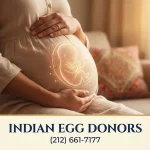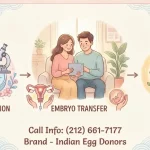Donating eggs is a highly personal and life-altering experience for both donor and recipient parents. Egg donation in Canada is governed by strict ethical and legal guidelines to protect all concerned. Whether you’re thinking of becoming an egg donor or want to have a child using donation, the following has everything you will ever need to know.
What Is Egg Donation?
Egg donation is the procedure in which a woman gives away her eggs so that another person or couple can become pregnant. The procedure is typically carried out by people who are unable to become pregnant with their own eggs owing to medical, age, or genetic issues. The donated eggs are utilized in the laboratory by means of the IVF (in vitro fertilization) procedure and implanted into the intended mother or gestational surrogate.
Is Egg Donation Legal in Canada?
Yes, egg donation is legal in Canada.
In Canada’s Assisted Human Reproduction Act (AHRA), one may not pay someone for donating eggs. Egg donors may, however, be paid for certain expenses incurred for the purpose of egg donation in Canada, such as travel, accommodation, childcare, and lost income. Altruistic donation is given priority, i.e., donors give their eggs in good faith, without being rewarded.
Who Can Become an Egg Donor in Canada?
To become an egg donor in Canada, you should normally have the following:
- Be between 19 and 30 years of age
- Be free of any physical and mental disease
- Be healthy BMI
- Be a non-smoker and not a drug addict
- Have regular menstrual cycles
- Be free of any history of hereditary or genetic disease
Each fertility clinic or agency will also have additional screening requirements, i.e., medical, psychological, and genetic examinations.
The Egg Donation Process: Step by Step
Knowledge of the process in advance will enable donors and intended parents to prepare for what is to come. This is typically how it is done in Canada:
1. Application and Screening
Donors complete a very detailed application providing information regarding family background, lifestyle, and medical history. They will be thoroughly screened, including:
- Blood tests and hormone levels
- Genetic carrier testing
- Ultrasound of the pelvis
- Psychological counseling
2. Legal and Counseling Sessions
While giving compensation is unlawful, the donors sign a legal contract that defines their rights and obligations. Counseling sessions give the donor a sense of moral and psychological considerations for donation.
3. Synchronization and Hormonal Stimulation
After matching the donor with the intended parent, the donor will receive hormone shots to make her ovaries release multiple eggs. This involves:
- Daily hormone injections for 10–14 days
- Regular monitoring via ultrasounds and blood work
4. Egg Retrieval
Once the eggs are mature, the donor has an outpatient, pain-free procedure called egg retrieval. It is conducted under light sedation and under ultrasound guidance. The recovery is rapid, and donors are typically back to normal activities in days.
5. Fertilization and Embryo Transfer
The eggs that are acquired are fertilized with the sperm of the donor or intended parent. Normal embryos are later implanted within the receiver’s uterus after a few days.
Benefits of Egg Donation
Egg donation is an extreme act of generosity. Among the foremost advantages to donors are:
- Assist others to create a family and live on.
- Feel a personal satisfaction in belonging to something worthwhile
- No-cost screening of health and fertility
- Reimbursement for travel and time
For individuals who dream of becoming parents but have infertility or genetic issues, donor eggs can restore hope and an opportunity to make becoming parents a reality.

Understanding the Emotional Journey
Donation of eggs is not only a medical procedure—it is an emotional one. Donors will feel great pride and satisfaction, but it is natural to have ambivalent feelings regarding anonymity, follow-up contact, or notification of future offspring. Counseling is beneficial as part of the preparation on the donor’s and recipient’s side.
Known vs. Anonymous Donation
Both known donation and anonymous donation are legal in Canada.
- Known donation: Both donor and recipient know one another’s identity and can stay in touch.
- Anonymous donation: Identifying information is not disclosed, yet the policy for the right of donor-conceived children to know is changing.
Donors can be anonymous initially, but are willing to make contact in the future, as long as there is consent from both.
Legal Considerations
As egg donation in Canada can always be a matter of altruism, legal contracts and attorneys are highly advised. This protects both the recipient and donor and informs all parties involved about parent rights, anonymity, and responsibility.
Also, donors are never-ever legal parents of any child conceived from their eggs; formal legal agreements only spell this out for everyone.
Frequently Asked Questions
Q1. Is egg donation legal in Canada?
Ans: Egg donation is permitted in Canada, but it has to be altruistic. The donors are not compensated for their eggs, but can be reimbursed for expenses that are reasonable and cover meals, travel, and lost work.
Q2. Who is eligible to become an egg donor?
Ans: Female donors between 19-30 years of age, who are nonsmokers, without any significant medical or genetic disease, and who have regular periods, are normally eligible to act as egg donors in Canada.
Q3. Will egg donation affect my future fertility?
Ans: No, egg donation will not generally damage your future fertility. The eggs that are removed are from your regular cycle, not your overall ovarian reserve.
Q4. What does the donation process involve?
Ans: It is accomplished through screenings, hormone shots for 10–14 days, and an uneventful outpatient procedure to remove the eggs. Most donors recover quite rapidly and can carry on with normal activities in a matter of days.
Q5. Can I donate my eggs anonymously?
Ans: Yes, you can donate as a known donor or anonymously. That is a completely personal decision and up to you, as well as the intended parents’ preference.
Conclusion
Egg donation in Canada is an amazing adventure of science, generosity, and dreams. As a medical procedure with legal guidelines, it’s truly one of having dreams come true for couples and individuals with infertility. If you are looking at donating your eggs or becoming an egg donor, details about the process allow you to make smart, confident decisions. With proper attention and care, egg donation can truly be an ultimate life-altering experience for all parties involved.
Ready to Take the First Step?
If you’re looking at egg donation or egg donor search in Canada, it begins with education, compassion, and professional care. At Indian Egg Donors, we’re dedicated to bringing caring women together with waiting families—truthfully, safely, and with individualized care at each step.
👉 Take the first step with Indian Egg Donors today and help build families.

Dr. Veera Saghar
As an Egg Donor Coordinator, she plays a critical role in our company. Her background as a medical graduate from ISRA UNIVERSITY in Pakistan provides us with a solid foundation in the medical sciences. She has seven years of clinical experience practicing in the USA. This has given her firsthand experience when collaborating with patients and their families.
She is responsible for managing the process of egg donation from start to finish. We identify and screen potential egg donors.










